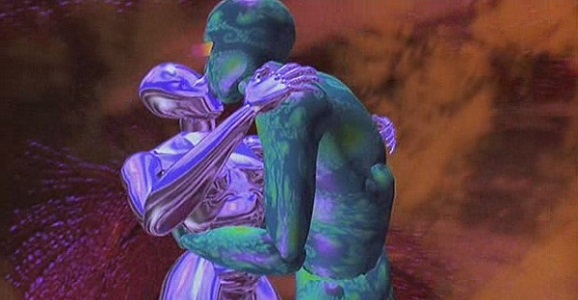Virtual Reality Can Create The Illusion Of Touch
This article is more than 2 years old
 We already knew that virtual reality could make you feel like you’re losing your head, even though you won’t actually experience any physical pain. Unless you strap the Oculus Rift too tightly around your skull. Researchers at the Swiss Federal Institute of Technology (EPFL) in Switzerland created an extension of reality in both the eyes and the body, as they managed to fool their human subjects into thinking they were experiencing something they weren’t.
We already knew that virtual reality could make you feel like you’re losing your head, even though you won’t actually experience any physical pain. Unless you strap the Oculus Rift too tightly around your skull. Researchers at the Swiss Federal Institute of Technology (EPFL) in Switzerland created an extension of reality in both the eyes and the body, as they managed to fool their human subjects into thinking they were experiencing something they weren’t.
For a study posted on Frontiers, the EPFL team challenged the notion of the body’s self-consciousness. They began by strapping a virtual reality helmet onto their heads of their volunteers, who were then presented with an average human form to look at. A red dot would appear over a certain area of the virtual body while a robot stroked the real person’s body in the same area, generally on their back or leg. (No robo-sexual harassment lawsuits happening here.) The researchers also measured their subjects’ skin temperature on various parts of the body, and performed a few other simple perception tests, such as asking the subjects to pretend they were dropping a ball and reacting whenever they assumed the ball would be hitting the floor.
This is all pretty straightforward, right? However, sometimes the volunteers were being touched on their back while the virtual being’s leg was in focus, or vice versa. When they were subsequently asked to identify where on their body they were being touched, around 70% of the subjects reported sensations in the same areas their virtual self experienced them, instead of where the robot actually touched them. It’s rather astounding to consider this, as I’m sure most people would puff up their chest and say, “That wouldn’t fool me! I’m in control of my body and perceptions.” But the research suggests otherwise.
Beyond the spoken admittance, the body temperatures also suggested physical confusion. The EPFL team found that the participants’ body temp decreased during the experiment, which suggests that virtual reality not only alters our sensory perception but also presents physiological changes within the body.
So what does one do with this knowledge? I mean, besides attempting to screw people out of money in some way. The researchers plan on furthering this study and incorporating prosthetics into it, as well as potentially branching out into identity-centric mental diseases such as schizophrenia.
Of course, when you’re talking about virtual reality, the subject of gaming will inevitably come up, and there are a vast amount of ways this study could possibly change the way horror and adventure games affect their players’ psyches. All we need are little robots to rub our backs and legs.
Speaking of VR gaming, watch the fucking amazing video below, in which the classic Nintendo game Paperboy is given a 21st century virtual reality makeover using an Oculus Rift system and a Kinect-connected exercise bike. It’s called PaperDude, so don’t get any lawyers involved. But get your throwing arm warmed up.












